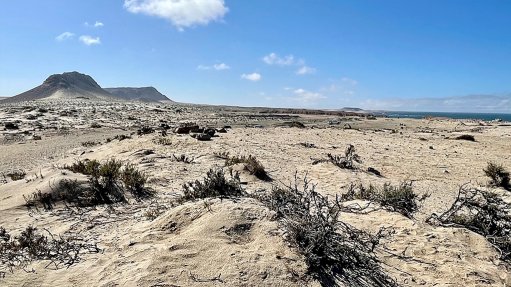
The Boegoebaai area
If green hydrogen can be produced efficiently and cost effectively in the Northern Cape, the country’s manufacturing capacity will likely migrate there, Northern Cape Economic Development Trade and Investment Promotion Agency (Nceda) CEO Hendrik Louw has said.
Speaking at the 2023 Hydrogen Economy Discussion on July 19, he said the Northern Cape and specifically the Namakwa region’s contribution to green hydrogen was potentially significant, owing to its ample renewable energy resources, which could be used to power electrolysis to produce hydrogen.
Moreover, Namakwa was well-positioned to export the green hydrogen, he pointed out.
He said green hydrogen was expected to supply 23% of global energy needs by 2050, with the majority of demand being driven by the European Union, China, Korea, Japan and the Middle East.
Louw explained that, by 2030, there would already be very strict obligations regarding green product exports. To achieve this, a transition needed to occur in both the production and beneficiation processes, as well as in the modalities of transport.
Green hydrogen would play a crucial role in the global energy mix. If society failed to address the challenge of heavy-duty mobility, it would hinder the effective transitioning of energy, including the implementation of systems like pipeline systems to supplement feedstocks.
“In addition, we also have to look at the critical inputs, such as fertiliser. We know that South Africa and the Northern Cape is a key export producer and is literally the food basket for Europe during their winter,” he said.
Louw explained that, as part of the commitment to the 2050 process, the first crucial step was to produce sufficient volumes of green hydrogen for export and to support the South African just energy transition process.
This transition is necessary as it involves converting a significant portion of local transport, feedstock, mining, agricultural and transportation industries to green alternatives.
Louw noted that the proposed Boegoebaai port and green hydrogen cluster, including the adjacent special economic zone, would be instrumental in helping South Africa become one of the low-cost exporters of green-hydrogen-derived products, while also enabling the decarbonisation of local industry.
Boegoebaai, which is situated about 60 km north of Port Nolloth and 20 km south of the border between Namibia and South Africa, in the Northern Cape, is ideally positioned to become a nexus point for green hydrogen production and distribution.
The location places it relatively close to the mining and agriculture sectors compared with other existing ports.
Nceda is in the process of preparing to secure R100-billion to fund the Boegoebaai development.